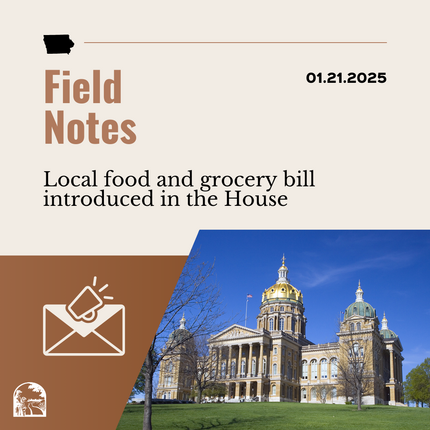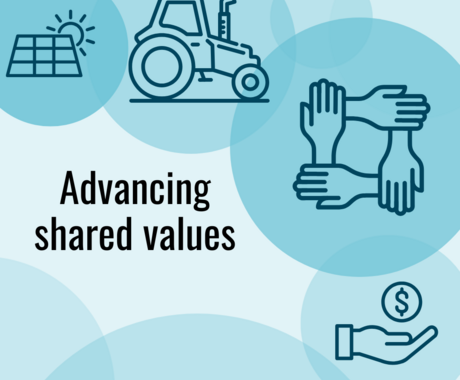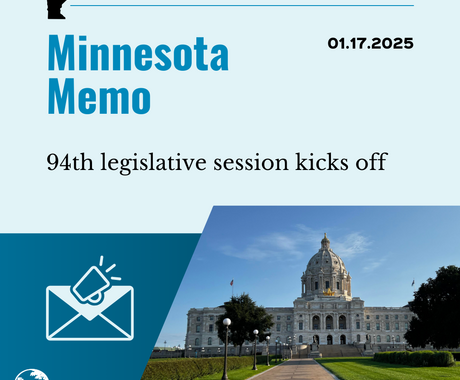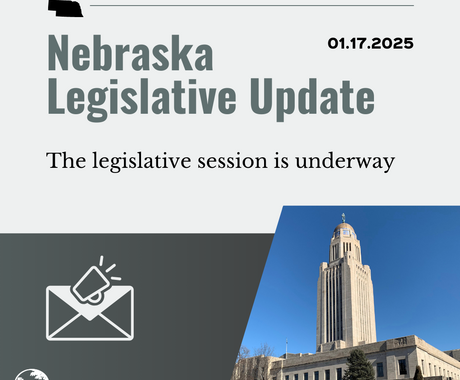Iowa lawmakers kicked off the 91st General Assembly last week and are now in week two. Full session hustle and bustle is underway, with more than 200 bills introduced last week and many more yet to come.
Without delay, the Center for Rural Affairs had priority legislation introduced. Nearly identical to legislation we advocated for last year, House File (HF) 59 would create the Grocer Reinvestment Program and Local Food Processing Program and appropriate $2 million for grants in both program areas. The bill has been assigned to a subcommittee of three representatives, but a meeting has not yet been scheduled. We expect the subcommittee will consider the bill this week and ultimately decide if they would like to move forward with the lawmaking process.
If positive action is taken, the bill will next be considered by the House Economic Growth and Technology Committee. Please reach out to your representative, especially if they are on the committee, and encourage their support when the bill comes up for consideration. To find your local legislators, click here.
As progress shapes up this legislative session, we will also monitor other bills related to rural food systems, water quality, and renewable energy, particularly in regard to statewide siting standards and utility integrated resource planning.
See below for more details about HF 59 and to read about the other bills we are following.
If you have any questions or would like to share the rural issues important to you, please do not hesitate to reach out to me at [email protected] or 402.687.2100 ext. 1034.
Thank you for making your rural voice heard.
Rural grocery / local food
HF 59 — Support: Introduced by Reps. Brian Lohse and Chad Ingels, this Center priority bill would create the Grocer Reinvestment Program and the Local Food Processing Program, as well as appropriate money for the grocery reinvestment and local food processing fund. If established as currently outlined, it would give the Iowa Economic Development Authority direction to create a grant program for new or current grocery stores located in areas that are both underserved and low or moderate income. The legislation would prioritize cost-saving efforts and business efficiency measures to ensure the long-term sustainability of locally owned grocery stores. Grants would be directed to help small, locally owned grocery stores selling perishable foods in rural communities. The bill was assigned to a subcommittee on Jan. 16, but a meeting has not yet been scheduled.
Senate Study Bill (SSB) 1012 — Support: Introduced by the Senate Committee on Health and Human Services by Chairperson Mike Klimesh, this bill would allocate funding to the Iowa Healthiest State Initiative to administer Double Up Food Bucks. This program doubles the investment for purchases of fruits and vegetables by Iowans participating in the Supplemental Nutrition Assistance Program (SNAP). It also specifically benefits local food producers who accept SNAP at farmers markets, grocery stores, and other local places of sale. The bill was assigned to a subcommittee, and a meeting is scheduled for tomorrow, Jan. 22, at 2 p.m.
Senate File (SF) 9 — Monitor: This bill was introduced by Sen. Jesse Green. It would distinguish two separate categories for food processing licenses: a general category and a category where meat or poultry is processed on a farm or private residence. In 2023, the general assembly revised the methods used to calculate the annual license fees imposed on food processing plants. The updated fees are outlined in the bill. The bill was assigned to a subcommittee on Jan. 15, but a meeting has not yet been scheduled.
HF 32 — Monitor: Introduced by Rep. Ingels, this bill would update the definition of a food processing plant to include operations located on a farm or private residence that store officially processed packaged meat or poultry. This bill is connected to SF 9. It also provides the license categories and correlating license fee structure. The bill was assigned to a subcommittee on Jan. 16, but a meeting has not yet been scheduled.
Water quality
SF 3 — Monitor: Introduced by Sen. Lynn Evans, this bill would designate additional flood mitigation activities to include reconnection of floodplains as well as wetland and oxbow restorations as “essential county purposes” in regard to the issuance of General Obligation bonds by counties. The bill was assigned to a subcommittee on Jan. 14, but a meeting has not yet been scheduled.
Renewable energy
We are actively monitoring for the introduction of energy bills, focusing on statewide siting standards for renewable energy and utility integrated resource planning.





